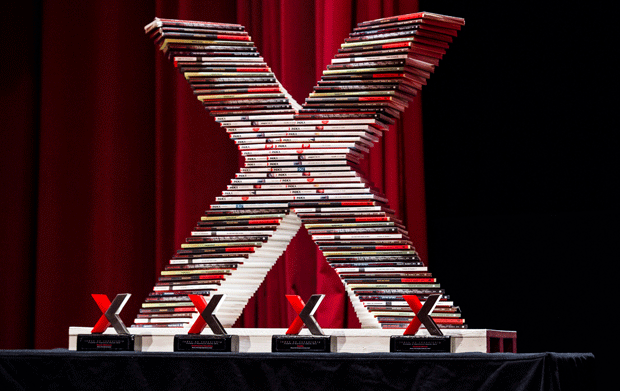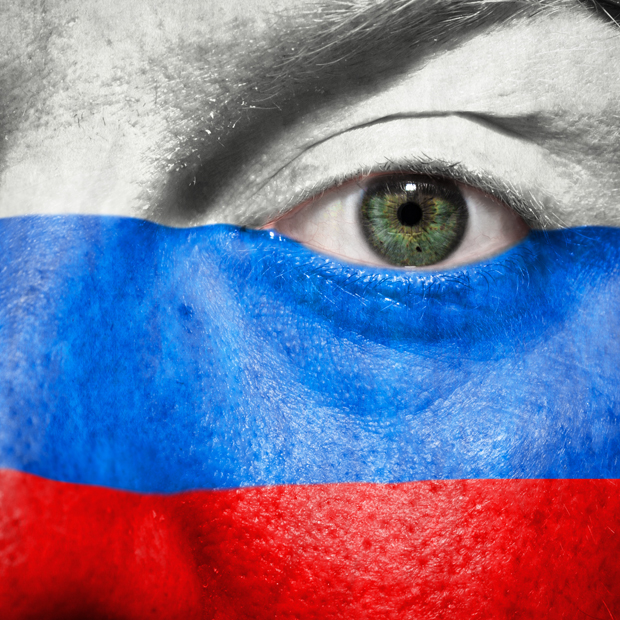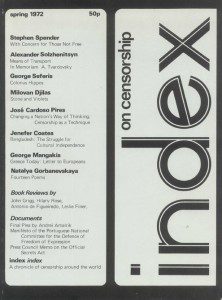14 Oct 2014 | Awards, News

(Photo: Alex Brenner / Index on Censorship)
Nominations for the annual Index on Censorship Freedom of Expression Awards 2015 are open. Now in their 15th year, the awards have honoured some of the world’s most remarkable free expression heroes – from Russian investigative journalist Anna Politkovskaya to education activist and 2014 Nobel Peace Prize winner Malala Yousafzai.
The awards shine a spotlight on individuals fighting to speak out in the most dangerous and difficult of conditions. As Idrak Abbasov, 2012 award winner, said: “In Azerbaijan, telling the truth can cost a journalist their life… For the sake of this right we accept that our lives are in danger, as are the lives of our families. But the goal is worth it, since the right to truth is worth more than a life without truth.” Pakistani internet rights campaigner Shahzad Ahmad, a 2014 award winner, said the awards “illustrate to our government and our fellow citizens that the world is watching”.
Index invites the public, NGOs, and media organisations to nominate anyone they believe deserves to be part of this impressive peer group. There are four categories of award: Campaigner (sponsored by Doughty Street Chambers); Digital Activism (sponsored by Google); Journalism (sponsored by The Guardian), and the Arts. Nominations can be made online and are open until November 20, 2014.
Jodie Ginsberg, CEO of Index, said: “The Index Freedom of Expression Awards is a chance for those whom others try to silence to have their voices heard. I encourage everyone, no matter where they are in the world, to nominate a free expression hero.”
Winners will be flown to London for the ceremony, which takes place at The Barbican on March 18 2015, and which will feature music and entertainment from across the globe.
In addition, to mark the 15th anniversary of the Freedom of Expression awards, Index is inaugurating an Awards Fellowship to extend the benefits of the award. The fellowship will be open to all winners and will offer training and support to amplify their work for free expression. Fellows will become part of a world-class network of campaigners, activists and artists sharing best practice on tackling censorship threats internationally. The fellowship will be launched formally later in the year.
Determination to tell the truth
Judges for this year’s Freedom of Expression awards include journalist Mariane Pearl and human rights lawyer Sir Keir Starmer. Sir Keir said: “Freedom of expression is part of the bedrock of civilised, democratic society. The Index on Censorship awards have a material influence on promoting such freedom and both celebrating and protecting those who fight against censorship worldwide. That’s why Doughty Street Chambers chooses Index as its principal charity.”
Alan Rusbridger, editor-in-chief, Guardian News & Media said: “We’re proud to once again be sponsoring the Journalism category of the Freedom of Expression Awards. Previous winners of this category have demonstrated dogged determination to tell the truth, and at a time when journalistic freedom is under pressure like never before, this category holds even greater significance.”
The Digital Activism Award will, for the second year running, be chosen by public vote. Google’s Head of Free Expression, Europe, William Echikson said: “Our support of the Index awards reflects our common concerns about the ongoing and increasing government crackdown against the free and open internet. When we first learned about the Digital Activism Award, we were immediately impressed with its motto, which celebrates the fundamental right to ‘write, blog, tweet, speak out, protest and create art and literature and music.’”
Index on Censorship is delighted also to have the continued support of academic and professional publishers, SAGE, for this year’s awards. Ziyad Marar, Global Publishing Director of SAGE, which sponsors the awards, said: “Through working with Index for many years both as publisher of the magazine and sponsors of the awards ceremony we are proud to support a truly outstanding organization as they defend free expression around the world.”
This article was posted on 14 Oct, 2014 at indexoncensorship.org
20 Aug 2013 | Digital Freedom, Index Reports, News, Politics and Society, Religion and Culture, Russia

(Photo illustration: Shutterstock)
The situation for freedom of expression, freedom of assembly and association in Russia has deteriorated since the re-election of Vladimir Putin in March 2012. The main issues of concern are repression against Russian NGOs, strict anti-blasphemy laws, increasing limits on digital freedom, the banning of “homosexual propaganda” and the re-criminalisation of libel.
Amendments to the law on Non-Governmental Organisations, adopted in July 2012, forced all NGOs that receive funds from abroad to register as “foreign agents” (a highly charged phrase, synonymous with “spy”) if they are involved in “political activities”, the latter term being very broadly defined. During March 2013, dozens of NGOs in Russia were inspected to determine whether their activities comply with current legislation. This potentially endangers the activities of NGOs in Russia including those working on freedom of expression and human rights groups.
Freedom of religious expression has been compromised through anti-extremism legislation that allows selective implementation of its ambiguous definitions. An anti-blasphemy law that provides for prison terms or fines for offending religious feeling was passed by Russia’s parliament in April 2013.
The attitude of the authorities to whistle-blowers has been highlighted through the authorities’ posthumously trial of lawyer Sergei Magnitsky. Magnitsky investigated cases of corruption among high-ranking Russian officials; he died in prison in 2009 in pre-trial detention and no one has ever been charged with his death.
Freedom of expression in the LGBT community has been restricted after the State Duma adopted a law prohibiting the promotion of homosexuality. Similar laws were previously introduced at the regional level in 11 administrative entities of the Russian Federation, including the second largest city St. Petersburg.
Media Freedom
Russia continues to be one of the most dangerous countries in the world for journalists. According to the Committee to Protect Journalists, 54 reporters have been killed in Russia since 1992, with 16 cases still unsolved. Impunity remains a significant problem for journalists: on-going threats of violence are rarely investigated properly by the authorities. The killers of Natalia Estemirova, Abdulmalik Akhmedilov, Khadzhimurad Kamalov and other prominent investigative reporters have never been prosecuted; nor have the organisers of Anna Politkovskaya’s murder.
In July 2012, criminal libel was reintroduced by the State Duma into the criminal code after being decriminalized in November 2011. Defamation laws are used to silence the press. Dmitry Muratov, the editor-in-chief of Novaya Gazeta, says courts are used as a censorship instrument in Russia. His newspaper lost three libel appeals in just one week in November 2011, all issued by the Department of Presidential Affairs after they published investigative journalism into federal budget spending.
Other legislative challenges to media freedom in Russia include a law on high treason that endangers Russian journalists who work for the international media, as it prohibits providing information to foreign countries, and a law that forbids the media from using obscene words. Another draft law will classify media outlets that receive more than 50 per cent of their revenues from abroad as “foreign agents”.
The genuine diversity of media ownership in Russia is questionable. Opinion polls by the Levada Centre show that 69 per cent of Russian citizens consider the three state-owned TV channels to be the primary source of their information. Most of the other national media outlets are either co-owned by the state, or belong to oligarchs who have relationships with the Kremlin. Several top managers and editors recently were fired or resigned from their positions in Kommersant and Gazeta.ru in protest against their owners’ intrusion into editorial policies. Several independent online publications critical of the authorities were closed down by their owners.
The lack of independent political and investigative reporting is not likely to be rectified by the launch of a new channel “Public Television of Russia”, scheduled for May 2013. While the new channel has been described as a public service broadcaster “equally independent from the state and advertising”, it will in fact rely on government funding. Furthermore, its CEO is appointed directly by the President of Russia, casting further doubts over its editorial independence.
Digital Freedom
As internet use grows in Russia, the authorities have introduced new restrictive laws that challenge free expression online and allow filtering and blocking of content. Federal Law No. 139-FZ, adopted in July 2012 created a blacklist of sites with “harmful” information under a pretext of child protection. The law suggested broad and ambiguous definitions that allow extrajudicial censorship of online content. Roskomnadzor, a dedicated state agency, compiles a black list of web-pages that contain child pornography, “extremist materials” and information on suicide or drug use. ISPs are obliged by the law to block all the blacklisted web-pages.
Extensive online censorship is accompanied by surveillance of Russians’ online activities. SORM, a nation-wide surveillance system, operated with Deep Packet Inspection (DPI) technology, allows the state security force not only to control, but even to intrude into the internet traffic of any internet user in Russia without any special permit or court decision.
There was a series of cyber-attacks on the websites of independent Russian media outlets, such as Kommersant, Ekho Moskvy, Bolshoi Gorod, Dozhd’ TV and Slon.ru, during the street protests in May 2012. No one has been prosecuted for these attacks.
Artistic Freedom
As the authorities of the country try to increase its electoral support among more conservative layers of society, they rely more on support of the Russian Orthodox Church. Increasingly close political relationships between the state and the church account for much of the persecution of artists and censorship of arts on grounds of “protecting of traditional values”. One of the recent draft laws, adopted by the parliament in the first reading, provides for five years in prison for “insulting believers’ feelings”. Reports talk about increasing self-censorship among artists; several cases of prosecution were noted as well.
In August 2012 Nadezhda Tolokonnikova, Maria Alekhina, and Ekaterina Samutsevich, members of punk group Pussy Riot, were each sentenced to two years imprisonment for organising a “punk prayer” in the Cathedral of Christ the Saviour in Moscow. Despite the group claiming their performance was an artistic act of political protest against President Putin’s regime, they were found guilty of “hooliganism motivated by religious hatred.” In October 2012, Samutsevich was released on probation, but sentences against the other two members of the band were upheld.
Anti-extremist laws and articles of the Criminal Code relating to incitement to religious hatred have long been used for censorship of art in Russia. In July 2010 art curators Andrei Erofeev and Yuri Samodurov were fined for organising the Forbidden Art 2006 exhibition in Moscow, after several of the works were claimed by prosecutors to “incite hatred” and “denigrate human dignity.” In December 2012, prosecutors in St Petersburg launched an investigation into an exhibition by British artists Jake and Dinos Chapman after visitors complained it was “blasphemous” and “extremist” for featuring images of a crucified Ronald McDonald and Nazi symbolism.
This article was originally published on 20 Aug, 2013 at indexoncensorship.org. Index on Censorship: The voice of free expression
30 May 2012 | Russia
Moscow journalist Sergei Aslanyan was stabbed repeatedly earlier this week. Anslanyan, who specialises in motoring and hosts a programme on state Mayak radio station, was attacked on 29 May after a stranger called him and asked to leave his apartment “for a talk”. Aslanyan was attacked as he left the house. He managed to call an ambulance himself, and is now in a stable condition in hospital, where he is under police guard.
Some of Aslanyan’s colleagues believe the attack was caused by comments about the prophet Muhammad he made on a radio station. Sergei Arkhipov, head or radio at VGTRK state holding, which owns Mayak radio, said Aslanyan heard his attacker say “You dislike Allah”.
The Muslim society of Tatarstan had expressed concerns about Aslanyan’s anti-Muslim comments in an appeal to Russia’s general prosecutor’s office. After the journalist was attacked, they condemned both the assault and premature conclusions about “Muslim trace” in the case. Their leader Rishat Khamidullin told journalists that Aslanyan was treated brutally and “such an attack after his insulting statements is no more than a provocation against the Muslims”.
Attacks on journalists are common in Russia. In April Novaya Gazeta reporter Elena Milashina was beaten near her house. In May three journalists of Novaya Gazeta branch in Ryazan were beaten. Another newspaper’s reporter, Diana Khachatryan, alleged she was threatened by pro-Kremlin youth movements after publishing an article about the United Russia congress.
The latest most scandalous attacks on journalists include the beatings of Kommersant’s Oleg Kashin, and Khimki Truth’s Mikhail Beketov, and the murders of Novaya Gazeta journalist Anna Politkovskaya and Natalya Estemirova, who wrote columns for the same paper while working for Memorial human rights centre. In the vast majority of these cases, no one has been brough to justice.
Freedom House placed Russia at 172 out of 197 countries for press freedom this year.



